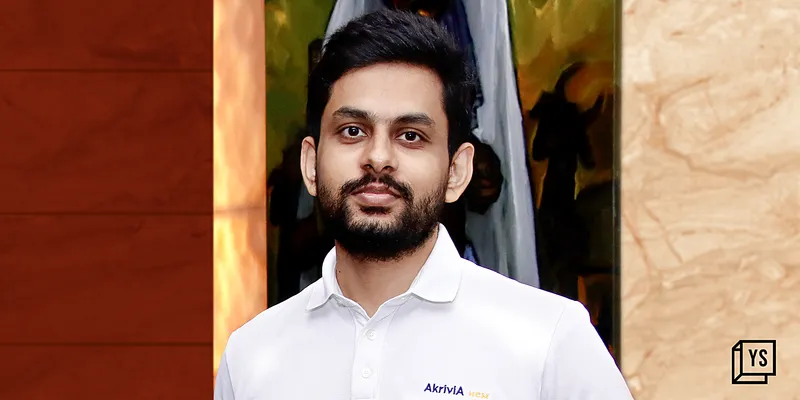Visakhapatnam-based Akrivia Automation expects its human management software business unit to turn profitable by July–in a year since launch–a milestone it wants to reach before it reaches out to investors seeking to raise at least $30 million in Series A funding.
“We do not want an investor who is looking for short-term profits. By the time we raise, we would anyway be profitable. So, it would be less dilution with more control over what we want to do,” says Rahul Varma Kalidindi, CEO and Co-founder of Akrivia HCM, in a conversation with YourStory.
The company’s first offering was an industrial solution for large enterprises, which is already profitable as a business unit.
Akrivia plans to deploy most of the funds raised for expanding to the Gulf Cooperation Council (GCC) and Southeast Asian markets, marketing, adding sales and support teams, and strengthening its senior leadership.
With its international expansion, Akrivia is hoping to clock Rs 100 crore (over $12 million) in annual recurring revenue, a measure of how much revenue the company can expect to earn from existing customers over the next 12 months.

Rahul Varma Kalidindi, CEO and Co-founder of Akrivia HCM
The starting point
Kalidindi co-founded Akrivia Automation, which was in the industrial Internet of Things space, with his father Raghu Kalidindi in 2016. For two years, the company did custom industrial projects. While delivering on these, the team realised the need for a solution in the manufacturing analytics space.
This led to the launch of Facttwin (an acronym for Factory Twin), which enables collection of data from different machines irrespective of their makes and makers and the protocols used by them for communication, using the company’s IoT gateway, in factories.
The data is used to glean insights that are made visible to everyone on the shop floor, so they can track key metrics and take corrective action, if needed.
Facttwin won several marquee customers, including Sun Pharmaceuticals Industries, Godrej Agrovet, and construction equipment manufacturer Tata Hitachi.
While working on implementing this solution in enterprises, the company had to integrate it with their client’s enterprise resource planning and human resource systems as well, which introduced the founders to the human resource management software (HRMS) space.
“We realised that adoption levels in HRMS systems were very low. Obviously, SAP, Oracle, and Workday have great products but they were either too complex for the end-user, were being implemented by third-party people who were not providing them with proper support, or were not localised for different geographies,” Kalidindi says.
This encouraged the founders to get into the HRMS space in 2018 when a good number of companies were shifting from on-premise HR products to cloud solutions–even though it is a very crowded market. Part of the revenues from the company’s Facttwin product in addition to the founders’ personal investments were used to build the Human Capital Management (HCM) product.
Akrivia Automation ramped up its headcount to over 350 employees since 2018 to focus solely on building the HCM product.
After about five years of working on the product, Akrivia Automation launched its HCM in July 2022.
In about six months’ time, it has managed to onboard 50 enterprise customers with around 150,000 users of its product, with its software-as-a-solution product priced about 30% lower than that of competitors, according to Kalidindi .
Around 90% of its paying customers have at least 2,000 employees on their payrolls.
New geographies, new hires
With Akrivia a few months away from breaking even, the company is planning to expand to the Gulf Cooperation Council countries (comprising Bahrain, Kuwait, Oman, Qatar, Saudi Arabia, and the United Arab Emirates) and Southeast Asia. It intends to invest $8 million to support its geographical expansion.
Currently, the SaaS company earns about 95% of its revenue from India, with a few customers in the Middle East and other markets. It expects the GCC and Southeast Asian countries to contribute to around 60% of its total revenue after a year.
While Akrivia’s average deal size is around Rs 25 lakh per customer in India, it expects this to increase by 3-4x in GCC countries.
“India is a price-conscious market. Globally also, if we overprice our products, especially with the current recession, one will not be able to survive. Expecting to get paid as much as Workday is going to get paid is not going to happen at least for the next four to five years,” says the company’s CEO.
The company is working on partnering with local companies for its global expansion to help sell its product. In the GCC markets, it has already signed up with four channel partners and three in Southeast Asia.
“If you do not have a local player, getting the trust of businesses in most markets is very challenging,” says Kalidindi , who is overseeing tweaking of its HCM product to suit different geographies.
For instance, in the Middle East, the company is building in a feature to deduct traffic violation penalties from salaries before they are disbursed to employees.
Akrivia now has 350 employees (of whom 250 are engineers) and is looking to add 500 more over the next 12 months. Half of the additions would be for engineering roles and the others for allied functions.
“The market has evolved from a customisation mindset to a configurability mindset. They (customers) might sign up for some product initially but they are likely to move away later. The only way you can address this problem is by having a very strong engineering team that can pretty much do any configuration under the sun if it’s possible,” Kalidindi says.










